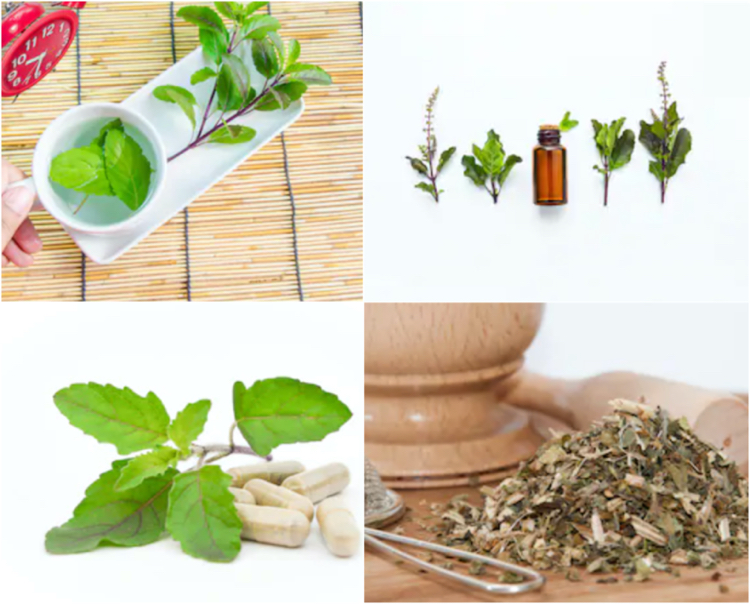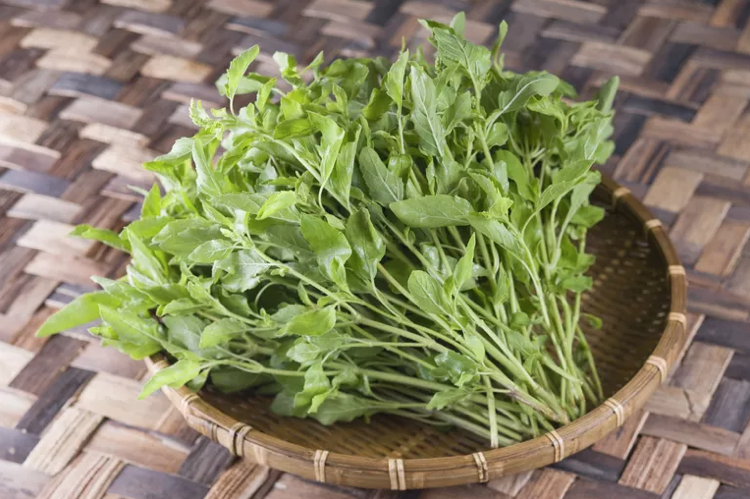Tulsi effect: The numerous advantages of holy basil as a medicinal herb
Holy basil (Ocimum tenuiflorum), commonly known as Tulsi in Hindi, is a sacred plant in Hinduism. It has purple flowers and green stems, which sometimes have a purple shimmer. This type of basil is much sharper than other types of basil such as Ocimum basilicum. Medicinal preparations are made from the leaves, stems and seeds of the plant. Holy basil is often used to cook Thai dishes and its spicy taste has given it the nickname “hot basil”.

Indians refer to the plant as “mother medicine of nature” and “queen of medicinal plants”. The sacred plant is said to promote a healthy body, mind and soul and is often planted around Hindu temples. The name Tulsi means “the incomparable”. Other names for holy basil are Indian basil, royal basil, Kala Tulsi, Krishna Tulasi, Manjari, Ocimum Sanctum, Rama Tulsi and Tulasi.
Health benefits

Tulsi basil is used in Ayurveda to treat many ailments, including H1N1 (swine flu), diabetes, cold, headache, fever, stress, stomachache, earache, and more. It has also been used as a mosquito repellent and topically (on the skin) to treat ringworm.
Tulsi is an adaptogen
In western medicine, holy basil is perhaps most valued for its action as an adaptogen. Adaptogens are active substances that occur in plants and increase the body's resistance to dealing with stress. The plant is used to combat the negative effects of stress in the body, to maintain a stable blood sugar level and as a preventive measure against signs of aging. Tulsi has a calming effect and can help with depression, anxiety or panic attacks. Indian basil is often combined with other adaptogens such as Ashwagandha, astragalus root, Siberian ginseng and turmeric to achieve optimal benefits through synergy effects.
Useful active ingredients in Indian basil

A 2017 review study reported that holy basil leaves contain several bioactive compounds. This includes:
- Eugenol: a terpene with analgesic properties, which is also contained in clove oil
- Ursol and rosemary acid: Compounds with antioxidant, anti-inflammatory and anti-aging properties
- Apigenin: A flavonoid that helps the body fight inflammation and kill cancer cells.
- Lutein: an antioxidant carotenoid that is important for eye health
- Ocimumoside A and B: Compounds that reduce stress and have a positive effect on the neurotransmitters serotonin and dopamine, better known as happiness hormones
In alternative medicine, Tulsi is typically used for asthma, bronchitis, arthritis, colds and flu. It is believed that some active ingredients in holy basil reduce swelling, pain, and inflammation.
What does research say?

In a review of 24 independent clinical studies on Tulsi in 2017, over 1,000 study participants (ages 10 to 80 years) were observed after taking Tulsi basil in various forms and dosages. In three main categories, Indian basil was found to “offer beneficial clinical effects”. The three groups are:
– metabolic disorders (15 studies on diseases such as diabetes)
– Neurocognitive disorders (4 studies on diseases such as Alzheimer's or mood disorders such as depression)
– immunity and infections (5 studies)

Research suggests that Tulsi, as an adaptogen, can relieve anxiety and improve mood. In a 2008 study of 35 adults with generalized anxiety disorder, the researchers found that taking Tulsi in capsule form twice a day for 60 days significantly reduced the level of anxiety. The subjects also reported that they felt less stress and depression.
Studies have found that holy basil has important health benefits in many inflammatory diseases. In fact, one of the studies concluded in an analysis that Tulsi contains many active ingredients that can work alone or synergistically (by other means) to help reduce inflammation.
In a 2009 study in mice, scientists discovered that a dietary supplement containing tulsi and cloves affected the lungs of the animals before colonization Klebsiella pneumoniae protects, a hospital-acquired bacterium that is known to cause pneumonia and urinary tract infections.
possible side effects

As with other dietary supplements, little is known about the safety of long-term or regular use of Tulsi due to a lack of research.
Tulsi can lower blood sugar and should be used with caution by diabetics who take blood sugar lowering medication.
Women who are pregnant or trying to conceive should not take Tulsi, as preliminary tieti studies have shown that holy basil can cause uterine contractions and negatively affect fertility. This may be due to its ursolic acid content. Tulsi can also increase testosterone levels.
Tulsi contains eugenol, which can cause liver damage in large quantities. An overdose is also possible and leads to symptoms such as nausea, diarrhea, fast heartbeat or cramps.
Another animal study showed that holy basil can slow the rate of normal blood clotting, and it is recommended to stop using the herb at least two weeks before a planned surgery and two weeks after any type of surgery.
Drug interactions

Tulsi basil is not recommended for those who are taking certain medications, such as anticoagulants (medicines that slow blood clotting). This includes:
Coumadin (warfarin)
Heparin
aspirin
Plavix (clopidogrel)
Fragmin (dalteparin)
Lovenox (enoxaparin)
Ticlid (ticlopidine)
As the adaptogenic properties of holy basil are known to lead to relaxation, people who are also taking drowsy medications should not use it.
Selection, preparation & storage

Tulsi is available in capsules, tinctures, powders and as herbal tea and is sold in selected shops and online. Look for the scientific name on the ingredient list Ocimum sanctum or Ocimum tenuiflorum.
Tulsi is often sold in combination with other herbs and spices and is contained in herbal tea blends that promote stress relief and energy. The herb itself is caffeine-free, but can be combined with other caffeine-containing tea leaves.
Europeans know Tulsi primarily as tea, which is drunk before bed because of its relaxing effects. 2 to 3 teaspoons of dried basil leaves are poured on with boiling water and soaked for 5 or 6 minutes. According to traditional Ayurvedic medicine, using the whole plant is the best way to ensure that all available bioactive ingredients are ingested.
The leaves can also be used as a spice when cooking, especially for Asian dishes. The taste is spicy and bitter, but some people still like to eat raw holy basil.
dosage

The safe and effective dose of any type of medication varies depending on a person's age, weight, and health. A safe long-term dose of holy basil (tulsi) is not well established in medical research studies. However, a number of doses have been used in short-term studies, including:
Early research showed that taking 500 milligrams (mg) of holy basil leaf extract twice a day for 60 days led to a reduction in anxiety and depression.
In the event of disorders of the central nervous system, 300 mg of holy basil leaf extract can be administered per day (for 30 days).
In preliminary studies, taking 400 mg of holy basil extract in the morning and 800 mg at night for six weeks reduced many symptoms related to stress, including sleep disorders and fatigue.
As a tincture solution, the average dose is 30 drops per day in three equal doses.
It is also important to note that self-treating an illness and avoiding or delaying standard care can have serious consequences. If you want to use Tulsi for health reasons, consult your doctor first.
Dry the basil leaves yourself

If you grow holy basil, you can harvest the stems and leaves before the flower appears. Dry the branches by hanging them upside down in a dark, cool place for two weeks. Store the dried herb in a jar with an airtight lid. Keep the jar in a cool, dark place and use the holy basil within a year.
Conclusion
Although holy basil is one of the most promising herbs for promoting health and well-being, there is not enough research available to finally prove its safety and effectiveness in treating many diseases. This does not diminish the many potential health benefits that have been confirmed by scientific studies. The use of medicinal and culinary herbs in Ayurveda is based on the incredible biodiversity of India, which is unrivaled by any medical system. However, none of the herbs used has a status comparable to tulsi or holy basil (Ocimum sanctum).

The post Tulsi effect: The numerous advantages of Holy Basil as a medicinal herb appeared first on Deavita.com | Living ideas, design, hairstyles, make-up, lifestyle, health and beauty tips.





















